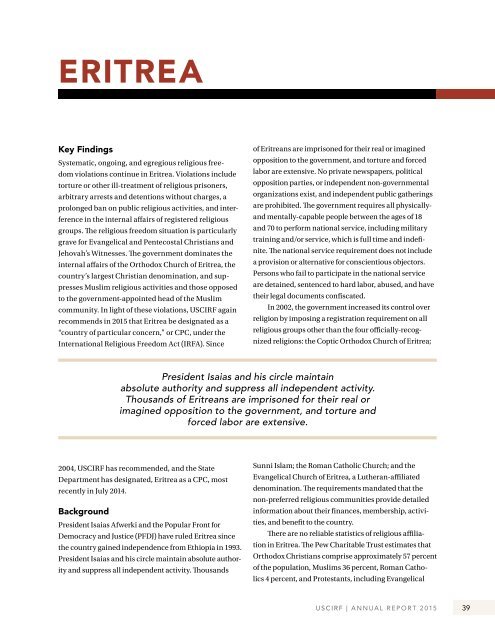USCIRF Annual Report 2015 (2)
USCIRF Annual Report 2015 (2)
USCIRF Annual Report 2015 (2)
Create successful ePaper yourself
Turn your PDF publications into a flip-book with our unique Google optimized e-Paper software.
ERITREA<br />
Key Findings<br />
Systematic, ongoing, and egregious religious freedom<br />
violations continue in Eritrea. Violations include<br />
torture or other ill-treatment of religious prisoners,<br />
arbitrary arrests and detentions without charges, a<br />
prolonged ban on public religious activities, and interference<br />
in the internal affairs of registered religious<br />
groups. The religious freedom situation is particularly<br />
grave for Evangelical and Pentecostal Christians and<br />
Jehovah’s Witnesses. The government dominates the<br />
internal affairs of the Orthodox Church of Eritrea, the<br />
country’s largest Christian denomination, and suppresses<br />
Muslim religious activities and those opposed<br />
to the government-appointed head of the Muslim<br />
community. In light of these violations, <strong>USCIRF</strong> again<br />
recommends in <strong>2015</strong> that Eritrea be designated as a<br />
“country of particular concern,” or CPC, under the<br />
International Religious Freedom Act (IRFA). Since<br />
of Eritreans are imprisoned for their real or imagined<br />
opposition to the government, and torture and forced<br />
labor are extensive. No private newspapers, political<br />
opposition parties, or independent non-governmental<br />
organizations exist, and independent public gatherings<br />
are prohibited. The government requires all physicallyand<br />
mentally-capable people between the ages of 18<br />
and 70 to perform national service, including military<br />
training and/or service, which is full time and indefinite.<br />
The national service requirement does not include<br />
a provision or alternative for conscientious objectors.<br />
Persons who fail to participate in the national service<br />
are detained, sentenced to hard labor, abused, and have<br />
their legal documents confiscated.<br />
In 2002, the government increased its control over<br />
religion by imposing a registration requirement on all<br />
religious groups other than the four officially-recognized<br />
religions: the Coptic Orthodox Church of Eritrea;<br />
President Isaias and his circle maintain<br />
absolute authority and suppress all independent activity.<br />
Thousands of Eritreans are imprisoned for their real or<br />
imagined opposition to the government, and torture and<br />
forced labor are extensive.<br />
2004, <strong>USCIRF</strong> has recommended, and the State<br />
Department has designated, Eritrea as a CPC, most<br />
recently in July 2014.<br />
Background<br />
President Isaias Afwerki and the Popular Front for<br />
Democracy and Justice (PFDJ) have ruled Eritrea since<br />
the country gained independence from Ethiopia in 1993.<br />
President Isaias and his circle maintain absolute authority<br />
and suppress all independent activity. Thousands<br />
Sunni Islam; the Roman Catholic Church; and the<br />
Evangelical Church of Eritrea, a Lutheran-affiliated<br />
denomination. The requirements mandated that the<br />
non-preferred religious communities provide detailed<br />
information about their finances, membership, activities,<br />
and benefit to the country.<br />
There are no reliable statistics of religious affiliation<br />
in Eritrea. The Pew Charitable Trust estimates that<br />
Orthodox Christians comprise approximately 57 percent<br />
of the population, Muslims 36 percent, Roman Catholics<br />
4 percent, and Protestants, including Evangelical<br />
<strong>USCIRF</strong> | ANNUAL REPORT <strong>2015</strong> 39


